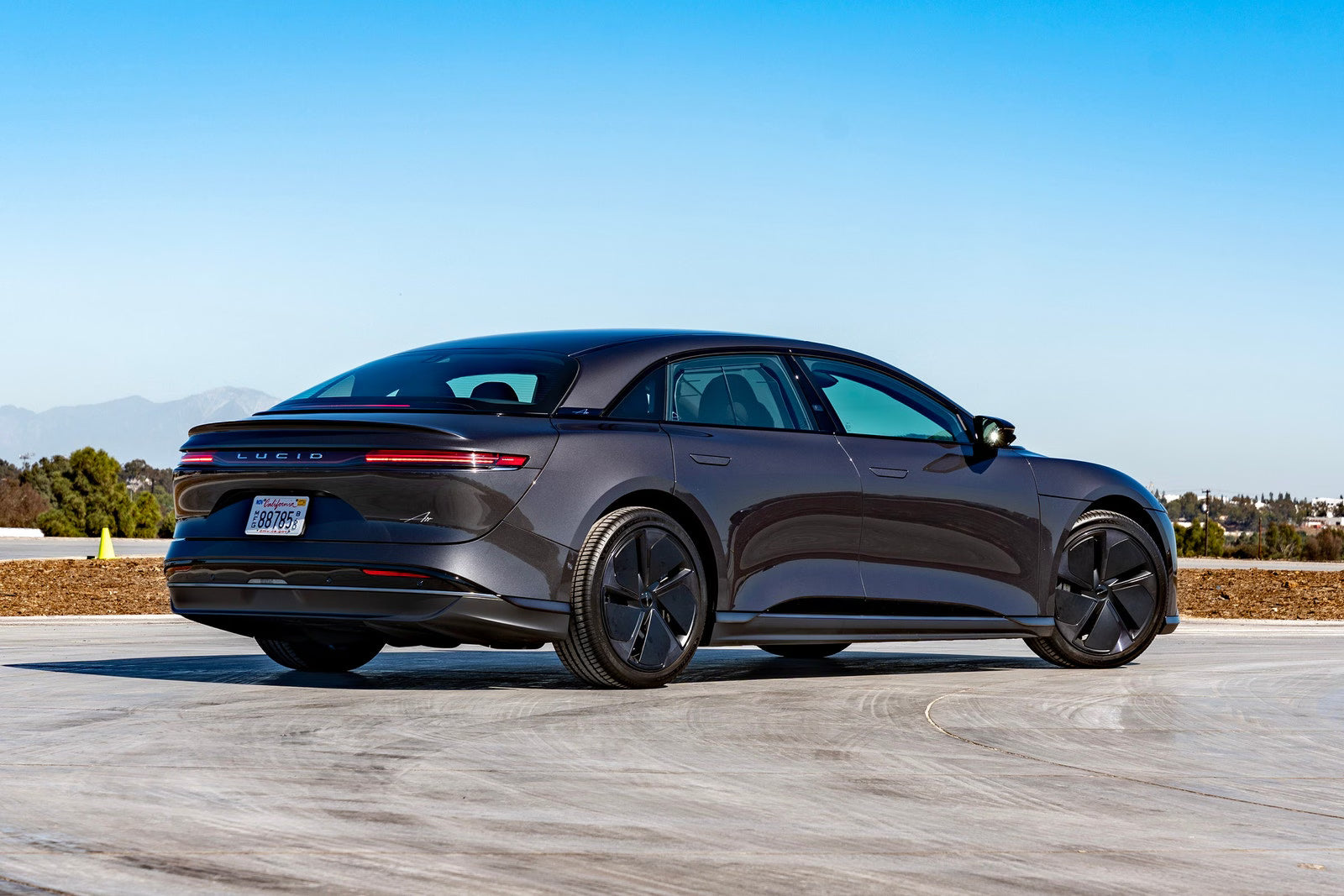Der Elektroautohersteller Lucid Motors sieht sich zunehmender Kritik von Leasingkunden ausgesetzt, nachdem Berichte über unerwartet hohe Gebühren für geringfügige Abnutzungserscheinungen bei der Rückgabe von Lucid Air-Leasingfahrzeugen aufgetaucht sind – darunter eine Gebühr von 1.450 Dollar für winzige Steinschläge in der Windschutzscheibe. Kunden bemängeln, dass die Leasing-Inspektion des Unternehmens nicht einheitlich sei , und viele stellen Lucids Standards und Transparenz in Frage.
Leasingrückgaben sorgen für Frustration wegen überraschender Gebühren
Das Problem wurde im Juni bekannt, als ein Lucid Air-Leasingnehmer im Lucid Owners Forum berichtete, dass ihm nach der Rückgabe seines Leasingvertrags eine Rechnung von 1.825 Dollar in Rechnung gestellt worden sei. Davon entfielen satte 1.450 Dollar auf drei kleine Glassplitter in der Windschutzscheibe. Diese kleinen Schönheitsfehler wurden bei der Rückgabe nicht gemeldet, und der Kunde hatte trotz Vollkaskoversicherung keine Möglichkeit, einen Anspruch geltend zu machen.
Zu den weiteren gemeldeten „Schäden“ gehörte ein Problem mit der Sonnenblende, das die Forumsnutzer auf den Inspektionsfotos nicht einmal identifizieren konnten. Der Abrechnungsprozess setzte dem Ganzen die Krone auf: Der Kunde erhielt wiederholt Rechnungen per Post und wurde aufgefordert, online oder telefonisch zu bezahlen. Nach der Deaktivierung seines Kontos konnte er sich jedoch nicht mehr anmelden. Ein Anruf bei der Nummer führte ihn direkt zu einem Inkassobüro , und Lucid Financial Services reagierte wochenlang nicht auf seine Anrufe.

Einige Kunden erhalten Rechnungen von über 5.000 US-Dollar
Es folgten weitere Berichte, in denen einem Leasingnehmer lange nach der Rückgabe seines Fahrzeugs eine Gebühr von 5.800 Dollar in Rechnung gestellt wurde – ohne vorherige Erklärung . Ironischerweise bezeichnete die Lucid-Mitarbeiterin, die seinen Leasingvertrag entgegennahm, dies als „eine der saubersten Rückgaben“, die sie je gesehen hatte. Der Kunde hatte keine Vorinspektion angefordert, da sein Fahrzeug gemäß den öffentlichen Richtlinien von Lucid keine Anzeichen übermäßigen Verschleißes aufwies.
Als er schließlich eine detaillierte Kostenaufstellung erhielt, enthielt diese 585 US-Dollar für einen als „Schmutz im Lack“ beschriebenen Lackfleck , 1.200 US-Dollar für fehlendes Plastik am Innenkotflügel und 200 US-Dollar für abgenutztes Gummi in der Smartphone-Ablage . Viele Forumsmitglieder fragten sich, ob diese Punkte tatsächlich gegen Lucids eigene Schadensrichtlinien verstießen.
Lucids Richtlinien zur Abnutzung sorgen für Aufsehen
Gemäß den Leasingrichtlinien von Lucid fallen Gebühren an, wenn neu lackierte Karosserieteile Schmutz oder Mängel aufweisen oder wenn die Zahl der Lackabsplitterungen mehr als elf beträgt . Bei Kratzern liegt die Grenze bei „größer als eine Kreditkarte“. Der in einer Rückgabe vermerkte „Schmutz im Lack“ scheint weit unter diesem Kriterium zu liegen. Im Innenraum erlaubt Lucids Richtlinie Gebühren für „alle Risse, Löcher oder Brandflecken, unabhängig von der Größe“ . Dies lässt den Prüfern großen Spielraum und viele halten die Standards für zu streng – oder absichtlich vage.

Lucid reagiert, bietet aber nur wenige konkrete Lösungen
Auf Anfrage von The Drive räumte Lucid Unstimmigkeiten bei der Handhabung der Leasingrückgabegebühren ein. In einer Erklärung erklärte das Unternehmen:
„Uns sind einige Fälle bekannt, in denen unsere Standards für die Rückgabe von Leasingverträgen nicht einheitlich ausgelegt wurden. Wir arbeiten mit unserem Bankpartner zusammen, um die Streitigkeiten zu lösen, und entschuldigen uns aufrichtig bei denjenigen, die Unannehmlichkeiten erlitten haben.“
Lucid wollte jedoch nicht klarstellen, welche konkreten Schritte unternommen werden, um die Aufsicht zu verbessern oder die Inspektionspraktiken an die veröffentlichten Richtlinien anzupassen. Die Leasingfinanzierung wird von Lucid Financial Services , einem Handelsnamen der Bank of America , abgewickelt, und die Inspektionsdienste werden von AutoVIN übernommen, was die Rechenschaftspflicht weiter erschwert, wenn Kunden Unterstützung suchen.

Kunden kämpfen mit verwirrenden Kommunikationskanälen
Ein frustrierter Kunde fasste es zusammen:
„Man wird zwischen Lucid, LFS und der Inkassoabteilung der BoA hin- und hergeschickt, und niemand weiß, wer zuständig ist. Selbst die Mitarbeiter scheinen sich nicht sicher zu sein, an wen sie sich intern wenden sollen.“
Dieser fragmentierte Prozess hat bei vielen Mietern ein Gefühl der Hilflosigkeit hinterlassen. Manche berichten, dass ihnen noch Monate nach der Rückgabe Gebühren berechnet wurden , ohne dass es dafür eine Erklärung oder Möglichkeit gab, diese einfach anzufechten.
Ein kleiner Sieg – aber er hatte einen Haken
Ein Forumsmitglied berichtete von einem Erfolg, nachdem es die Lucid-Führungskräfte in einer letzten E-Mail per CC kontaktiert hatte. Eine Gebühr von 200 Dollar für einen 1,5-Zoll-Felgenkratzer – eine Größe, die laut Lucids eigener Dokumentation nicht in Rechnung gestellt wird – wurde schließlich erlassen. In der Antwort bezeichnete ein Manager von Lucid Financial Services die Rückerstattung als einen Akt des „guten Willens“.
Der Kunde war zwar mit dem Ergebnis zufrieden, von der Rahmung war er jedoch nicht beeindruckt:
„Es ist enttäuschend, dass sie die Korrektur wie einen Gefallen behandelt haben, anstatt einfach das Richtige zu tun.“
Er fügte hinzu, dass er derzeit einen weiteren Lucid least, diesen aber nicht verlängern werde.

Die Unsicherheit bleibt bestehen, während der Druck auf Lucid steigt
Angesichts der zunehmenden Frustration der Kunden steht Lucid nun unter Druck, seinen Leasing-Inspektionsprozess zu standardisieren, die Verantwortlichkeiten seiner Dienstleister zu klären und sicherzustellen, dass geringfügiger Verschleiß nicht ungerechtfertigt bestraft wird . Fahrer von Elektrofahrzeugen, die ihre Lucid Air-Leasingverträge zurückgeben, sollten daher jeden Zentimeter ihres Fahrzeugs dokumentieren – und sich auf unerwartete Kosten gefasst machen.
Empfohlene Lektüre: Tesla muss volle Gebühr für autonomes Fahren zurückerstatten, da Funktionalität nicht bereitgestellt werden konnte








Aktie:
Teslas Modell-Y-Refresh scheitert angesichts wachsender Herausforderungen für den Elektroauto-Giganten
Die besten Leasing- und Finanzierungsangebote für Elektrofahrzeuge im August 2025